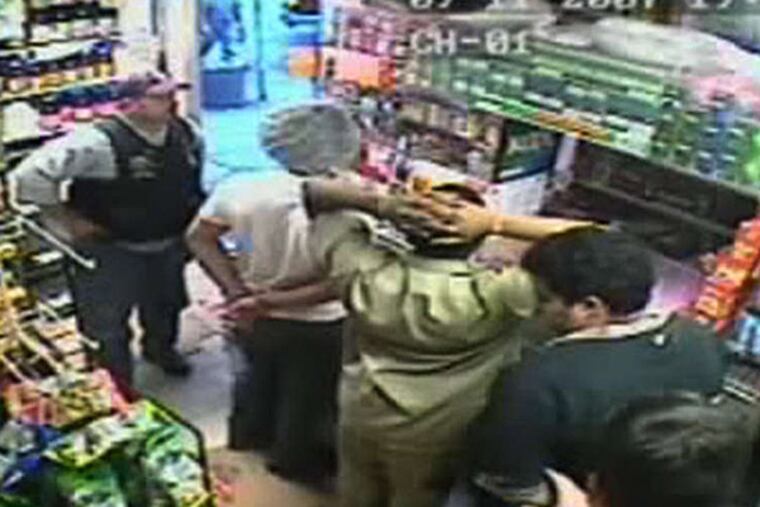Bodega owners question the injustice
Statute of limitations has run out for bodega and corner store merchants who say they were burglarized by rogue narcotics squad.

TWO CRIMINAL investigators, part of an FBI-led task force, came to Juan Collado's bodega in 2009 to hear his story.
Collado struggled to explain in English how a narcotics squad had barreled into his Tioga store, cut wires to his video-surveillance system and - once the cameras went dark - stole almost $10,000 and cartons of Marlboro Lights.
He asked them for a Spanish interpreter and they promised to return with one. They never did.
Now it's too late.
Last week, news broke that federal prosecutors had decided not to file criminal charges against the officers. And the five-year statute of limitations has run out, not just in Collado's case but for nearly two dozen other merchants with similar allegations.
"They played the clock game. They let time run out," said Danilo Burgos, the former head of the 300-member Dominican Grocers Association who is running for a state House seat in North Philadelphia. "Now no charges will be filed and people have no confidence whatsoever in the process."
Collado was one of more than 20 bodega and corner-store owners who independently told the Daily News in its 2009 series "Tainted Justice" that narcotics officers had destroyed their video cameras and then pocketed cash, helped themselves to food and drinks, and walked out with armfuls of merchandise.
Several merchants told reporters this week that they were angry - and puzzled: How could U.S. Attorney Zane David Memeger close the case without conducting, in their minds, a thorough investigation?
Investigators never talked to Eunice and David Nam, a frail Korean couple, ages 63 and 68 respectively, who own an Olney tobacco shop, and alleged that the officers stole between $3,000 and $4,000 in cash and goods during a July 2007 raid, according to their son, Steven Nam.
"They are very disappointed, to say the least, that the cops are not facing any charges," he said. "They were basically robbed. The only difference was that instead of the robbers being disguised in a mask, they were disguised as police."
Nam, 34, said his parents still worry that they could be terrorized again. Eunice Nam had told the Daily News in spring 2009: "We were on floor. Handcuffs on me. I so, so scared, I wet my pants."
A spokeswoman for the U.S. attorney declined to comment yesterday.
The Daily News could not find a single merchant who said they had been called to testify before a grand jury, which mystified several former federal prosecutors.
"These are serious allegations of misconduct . . . so it's hard to imagine that they weren't taken seriously," said Don Cochran, a former federal and state prosecutor who is now a law professor at the Belmont University College of Law in Tennessee. He is best known for successfully prosecuting Bobby Frank Cherry in 2002 for the murder of four girls in the 1963 Birmingham, Ala., church bombing.
"However, if many of the alleged victims weren't interviewed or called before a grand jury, then it's hard to see how a thorough investigation was done," Cochran said.
Jeffrey Lindy, a Philadelphia defense lawyer and former federal prosecutor, said the U.S. attorney here "has a very well-earned reputation for not shying away from difficult police-corruption cases."
If true that no merchant appeared before a grand jury, prosecutors likely had good reason, Lindy said. He cited three examples: prosecutors questioned the veracity of their story; they lacked evidence to back up their story; or they had "baggage" that would open them up to "withering cross-examination."
In fact, the officers had arrested the merchants on mostly misdemeanor charges for selling little zipper-sealed bags, which police say are used to package drugs. None of the merchants had criminal records. All were legal immigrants.
Dominican merchant Jose Duran provided investigators with a video that captured some of the September 2007 police raid on his West Oak Lane bodega. In the video, the officers are seen slicing wires to Duran's surveillance system. Duran alleged that the officers stole about $10,000 in cash and goods after the cameras cut out. Duran has said he was interviewed once by investigators but then heard nothing more.
Moe Maghtha, whose family moved here from Jordan and owns a South Philly tobacco shop, recalled yesterday how he and his father sat down with two investigators at the FBI's Philadelphia headquarters and talked to them, with their attorney present, for about an hour.
Maghtha, 28, said an investigator later came to the store to dust for fingerprints, but they never heard back.
"Honestly, I think it just makes no sense," Maghtha said. "I don't care who you are - you could be a cop or an FBI agent, and if you do something wrong, you should get charged with it. Look what they did to people. How are you going to let a cop walk away like that?"
Anh Ngo, like the Nams, said that she was never interviewed by investigators about what unfolded in her family grocery store in the Lower Northeast during a 2008 raid. Ngo, 30, said the officers smashed the cameras with a sledgehammer and stole about $12,000, taking her mom's diamond ring and emptying their wallets.
"To think that some light was shined on this by the Daily News and then the investigation just died, it's really very frustrating," she said Monday. "[The cops] are living nice off of the money they stole from us."